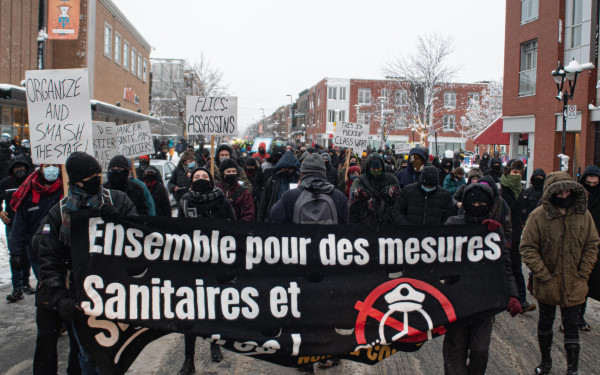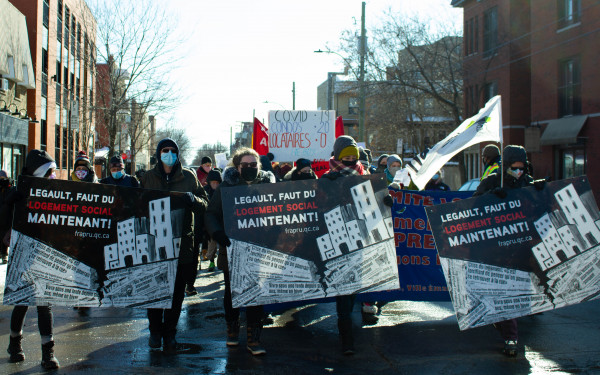Interns and students protest for labor rights and fair pay
General strike held on unpaid internships in solidarity for interns in Italy and Montreal
Un salaire pour toustes les stagiaires mobilized a protest in front of the Italian consulate in order to demand paid work for interns in Quebec.
The SPTS is a UQAM student-run collective dedicated to advocating for the rights of students and unpaid internships.
From March 21 to 25, students and interns across Quebec are going on strike against issues like tuition hikes and expensive education, unpaid internships, and climate change.
As a part of this movement, SPTS took to the streets to make their voices heard.
The protest was initially organized to express solidarity with Italian students protesting the deaths of Lorenzo Parelli, and Giuseppe Lenoci. Aged 18 and 16 respectively, both lost their lives while on internship training in Italy.
Along with the SPTS representatives, a couple of dozen students attended the protest, holding signs and demanding justice and fair treatment for the students’ hard work. Most of the students wished to be kept anonymous, for their own safety and job security.
“I am here because I support the cause,” said Jousquin Beauchemin, a supporter of the protest. “Internships are real work, and we aren’t getting paid for it.”
Dahbia Illoul, a social science student and social work preparatory intern at UQAM, as well as an SPTS delegate, expressed her concerns.
“The government has a set budget for interns, and they are not paying us. We simply want fair treatment and payment,” she said. “The only solution for students is for universities to require all internships to be paid by the government and internship organizations.”
According to the collective’s press release, interns continue to make up for the shortage of personnel in education, healthcare, and social services. Furthermore, internship conditions are extremely demanding. Even during the pandemic, unpaid work remains a hardship for many people.
“I work long hours and work alongside teachers who get paid, get benefits and a salary provided from the job. Meanwhile I don’t, because I am on an internship,” said a UQAM student, who wished to remain anonymous.
According to the same organizer, whether or not an internship is paid largely depends on the program. Apart from engineering and business, many students in other fields, like teaching and social work, do not have the access to paid internships.
“We want the government to give salaries to all interns. If the government can pay for us and our work, why aren’t they paying for our labor,” said one protest organizer who wished to remain anonymous.
The organizer also gave insight on her struggles with her schedule and financial burdens. She juggles a four-day workweek at her unpaid internship and a class at university.
“This leaves me, and many other students, only the weekend to work another paid job, in order to provide for myself and pay my rent and tuition," she said. "Since January, I have had three days off collectively, which brings a huge weight upon me."
According to Illoul, interns aren’t considered employees and therefore don’t have access to many standard employee benefits. If they have medical issues, experience sexual harassment, or have concerns about sexual assault, or any other problem, students would not be provided with a solution from the school.
One of the protestors, who is also majoring in education at UQAM, explained the necessity for workplace safety and the benefits that come with paid internships.
“Due to a medical injury, I had to choose between stopping my internship and adding another extra year to my bachelor’s degree or continuing working with my broken leg. And for two weeks I chose to work with crutches” they said.
Another student and supporter of the collective, who wished to remain anonymous, expressed his opinion on the government and universities' role in paying students for their work.
“The universities could play a huge role in pressuring the government and the workplaces that can afford to pay their interns, but don’t because they do not have the legal obligation to,” he said.
Illoul urges students to support the cause and join the fight for student equality in the workplace.






